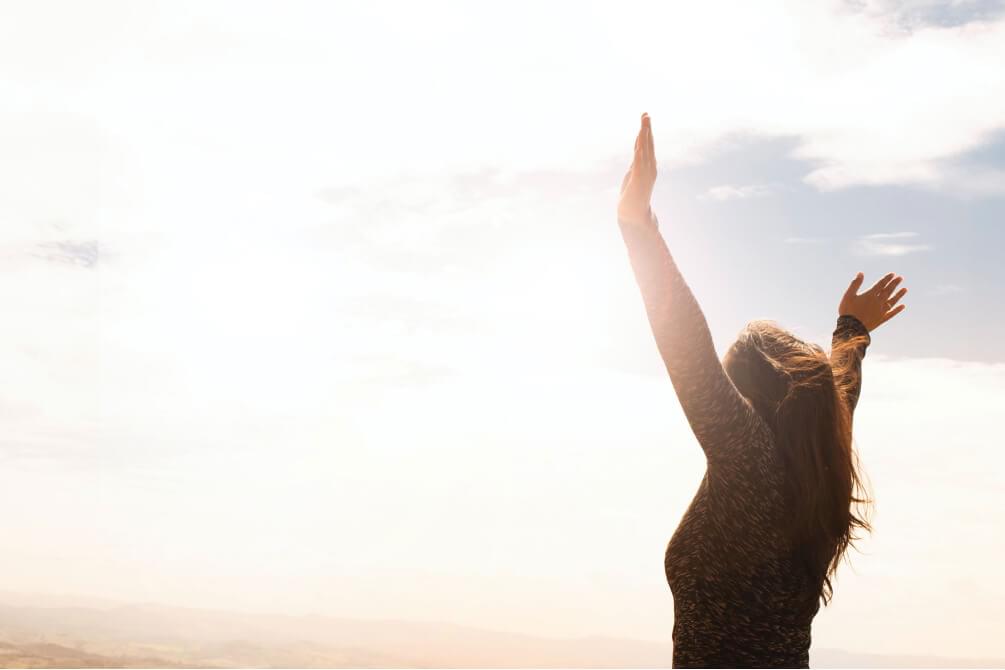We help at-risk LGBTQI+ individuals get to safety around the world.
See our mission in action here
We help at-risk LGBTQI+ individuals get to safety around the world.
See our mission in action here
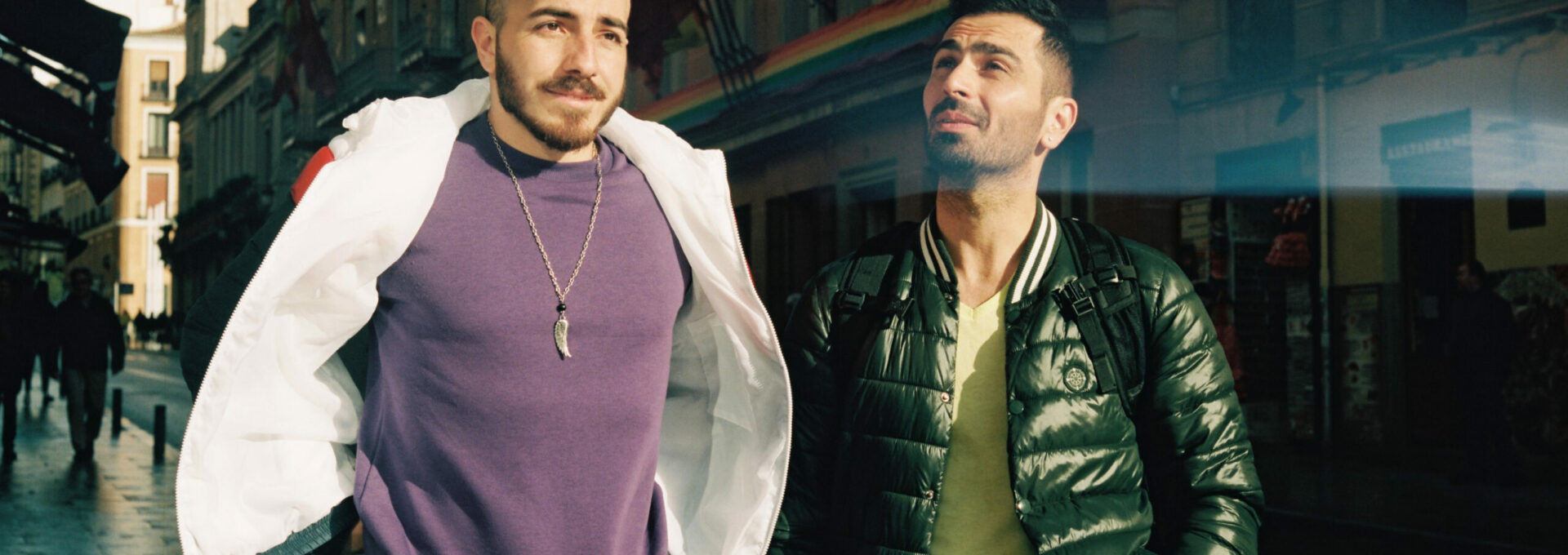
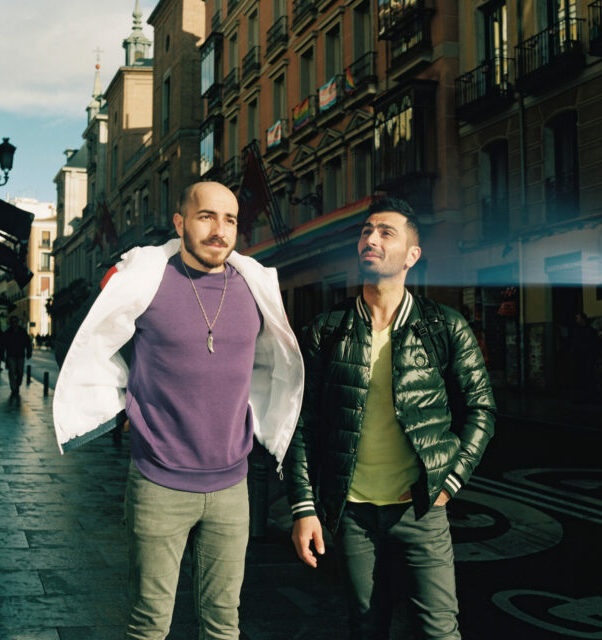
Rainbow Railroad is a global not-for-profit organization that helps at-risk LGBTQI+ people get to safety worldwide. Based in the United States and Canada, we’re an organization that helps LGBTQI+ people facing persecution based on their sexual orientation, gender identity and sex characteristics. In a time when there are more displaced people than ever, LGBTQI+ people are uniquely vulnerable due to systemic, state-enabled homophobia and transphobia. These factors either displace them in their own country or prevent them from escaping harm.
As a result of Rainbow Railroad, more LGBTQI+ individuals can access lives free from persecution, and ultimately, we envision a world where LGBTQI+ people can live lives of their choosing, free from persecution.
Since our founding, we’ve helped over 19,000 LGBTQI+ individuals find safety through emergency relocation, crisis response, cash assistance, and other forms of assistance. Our story has received international media attention, including a feature on CBS 60 Minutes.
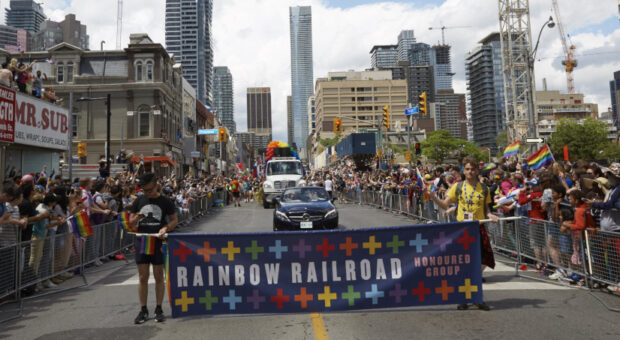
Rainbow Railroad was founded in 2006 as a volunteer-run organization by a diverse group of LGBTQI+ activists and human rights defenders who wanted to do more to address the levels of violence LGBTQI+ people face worldwide. Our name harkens back to the Underground Railroad – a network of activists in the 19th century, who assisted Black folks escape enslavement in the American South.
Rainbow Railroad scaled up its operations after receiving charitable status in Canada and the United States in 2013 and 2015 respectively.
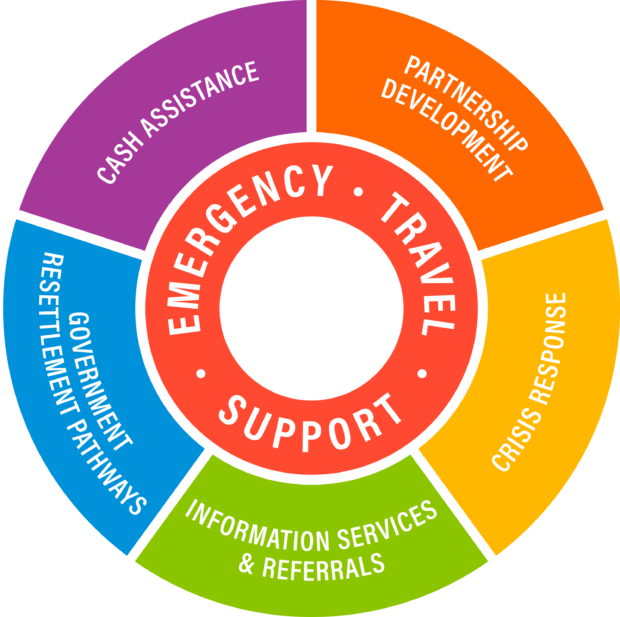
There are currently 120 million displaced people around the world – the highest number since the end of the Second World War. We received over 15,000 requests for help in 2023 from LGBTQI+ people whose lives are in danger. While we cannot relocate everyone who reaches out to us, we offer a variety of programs to support individuals’ unique needs and circumstances. Working with partners on the ground, we get at-risk LGBTQI+ people to safety, worldwide.
We work in all regions around the world, based in Canada and the United States. Our work is completed in partnership with a global network of activists and human rights defenders advocating for LGBTQI+ rights in countries around the world. The people we help are often experiencing police harassment, family violence, employment discrimination or forced conversion therapy. In some cases, they endure life-threatening attacks perpetrated by members of their families or communities. This year, we’ll resettle people from over 40 countries into over 20 different countries of safety around the world.
Learn more about where we work and what we’ve done so far by reading our annual reports, found at the bottom of this page.
11 countries in the Caribbean still criminalize same-sex intimacy. The result of these laws is a culture of oppression which often results in the violent persecution of LGBTQI+ persons. Human rights defenders on the ground bravely work within these conditions, however, in countries such as Jamaica, LGBTQI+ people face omnipresent threats.
Reports from those experiencing persecution in Jamaica are staggering. Rainbow Railroad caseworkers frequently help individuals who have been brutally attacked, sexually harassed, assaulted, burned with acid or fire, received death threats or had gang violence occur in their neighbourhoods. Although victims sometimes report these crimes to police, they rarely result in protection or charges against perpetrators.
Rainbow Railroad works with a robust network of partners and activists on the ground in Jamaica. These essential partnerships assist us in identifying vulnerable persons, verifying their files, finding evidence for their claim and supporting the creation of a plan for their escape.
The COVID-19 pandemic has worsened the situation for many LGBTQI+ people living in unsafe countries. COVID-19 has exacerbated inequalities in access to health care, increased the risk of stigmatization and hate speech directed towards LGBTQI+ people and heightened the risk of domestic abuse and violence for those forced into lockdown with family members or partners.
Throughout the pandemic, Rainbow Railroad has continued to provide life-saving assistance to LGBTQI+ people threatened with violence and persecution around the world.
To provide key information about how the pandemic was impacting marginalized LGBTQI+ populations, we published a report “The Impact of COVID-19 on Displaced LGBTQI Persons.” Drawing on research work from a partner organization and interviews with human rights defenders around the world, this report made four recommendations to policymakers.
In general, the human rights of LGBTQI+ people in Eastern Europe are respected, with the exception of Russia and increasingly Poland and Hungary. The majority of people reaching out to us for help in the region come from Russia and the Caucasus.
LGBTQI+ persons in Russia and other constituent republics of Russia (such as Chechnya) face ongoing persecution and a lack of basic human rights. Although Russia decriminalized same-sex sexual activity between consenting adults in private in 1993, this has consistently been under threat.
More recently, Russia’s notorious 2013 anti-gay “propaganda” law has been used as a tool for outright discrimination. Under the law, portraying same-sex relations as socially acceptable in the public domain and in the presence of children is illegal. This has led to increased homophobic, transphobic and biphobic violence throughout the region.
The most egregious example of this violence has taken place in Chechnya. The 2017 anti-gay purge in Chechnya involved forced disappearances and extrajudicial killings by the police, military and state actors. Gay and bisexual men were identified through online profiles and underground intelligence, and rounded up and tortured for information regarding the identities of other LGTBQI+ people. Women and trans folks were also targeted.
Rainbow Railroad was one of the first international organizations on the ground in Russia during the height of the purge. In partnership with numerous international governments, we have relocated more than 100 individuals from Chechnya, the Caucasus and Russia who were targeted during the crackdown. We continue to work with the Russian LGBT Network, providing support and emergency relocation on a case-by-case basis for victims of ongoing waves of violence in Chechnya.
LGBTQI+ persons lack human rights protections in most of the states that make up the Middle East and Northern Africa (MENA). Sex between men is illegal in 10 of the 18 countries that make up the region; it is punishable by death in six. In addition, recent conflicts across the Middle East, including in Iraq, Syria and Yemen, have displaced millions of people.
Moreover, authoritarian regimes in countries such as Egypt have led targeted campaigns against LGBTQI+ persons. For example, on September 22, 2017, when the Lebanese band Mashrou’ Leila (with lead singer Hamed Sinno, an openly gay, cisgender man) performed in Cairo, a few LGBTQI+ audience members showed their solidarity by raising the pride flag. But this simple act of pride set off a state-led anti-LGBTQI+ crackdown. Conservative media outlets in Egypt condemned the activists, and 60 individuals were arrested immediately after the concert. The Egyptian state continues to target, imprison and torture LGBTQI+ individuals, and has been accused of countless human rights violations against those arrested.
We responded to this crisis directly and in partnership with a number of international human rights associations, grassroots LGBTQI+ organizations and activists based in Cairo. Working in partnership, we were able to relocate survivors. To this day, we remain active in the region.
35 countries on the African continent criminalize lesbian, gay, bisexual, transgender, queer and intersex individuals. Many of these countries border each other, meaning that people who seek safety in neighbouring countries still face criminalization. Many human rights defenders and activists are trying to remove laws that criminalize same-sex intimacy – a legacy of colonialization. Some countries, like Uganda, have sought to implement harsh laws targeting LGBTQI+ people including a law imposing the death penalty for gay sex.
Rainbow Railroad also works in partnership with local human rights defenders to fight state-directed crackdowns against LGBTQI+ people in Africa. One recent instance was a raid on a LGBTQI+ shelter in Uganda in March 2020. We provided support and safe houses to human rights defenders who helped free those swept up in the crackdown. Once prisoners were released, we continued to support their safe relocation within the country. Many who were arrested were outed on national TV, meaning they could face further community-driven violence because of the prominence of homophobic and transphobic attitudes in Uganda.
Central and South America are undergoing a crisis of migration and displacement. Amongst those forced to flee are LGBTQI+ people, who face unique challenges.
Central America
Mexico, is a meeting place for migrants from across Central and South America seeking safe harbour in the United States. But border towns in Mexico are facing gridlock as refugees attempt to be recognized and protected.
LGBTQI+ individuals are particularly vulnerable in the context of this crisis. Rainbow Railroad is partnering with a number of organizations and shelters providing life-saving legal, housing and basic needs support for migrants and asylum seekers. Further, we are advocating for pathways to safety in the U.S. and potentially some European countries.
South America
Venezuela is another major source of displaced LGBTQI+ people. Nearly 5.3 million Venezuelans have fled the country since 2015, making this crisis comparable to the Syrian refugee crisis – the largest mass migration in history. This migration had led LGBTQI+ people to seek out dangerous pathways to neighbouring countries, often becoming the victims of violence along the way.
We are partnering with organizations in countries such as Ecuador, which are receiving and supporting LGBTQI+ refugees from Venezuela.
We stand in solidarity with LGBTQI+ groups and civil society organizations advocating for humanitarian solutions to the migrant crisis at the U.S.-Mexico border. We are advocating for laws and policies that allow asylum seekers from Central and South America to enter the United States.
Watch our video about LGBTQI+ migrants in Central and South America.
Countries in South and Central Asia offer little protection to LGBTQI+ communities. 21 out of 49 states outlaw same-sex intimacy and only nine protect against discrimination. While progress is steadily being made in Taiwan and Thailand, much of the region remains firmly entrenched in homophobic and transphobic legislation.
South Asia
Originally imposed by the British Raj, Pakistani law criminalizes sodomy and though the Transgender Person (Protection of Rights) Act 2018 was introduced, no protections exist for the violent discrimination, harassment, and abuse Pakistani LGBTQI+ communities face regularly. In 2020, a prominent trans activist, Nayyab Ali, was attacked and held hostage in her own home, prompting swift international condemnation and fears of heightened violence against trans communities.
Rainbow Railroad is partnering closely with NAZ, the only public LGBTQI+ organization in Pakistan. NAZ provides sexual health, welfare and advocacy support to LGBTQI+ individuals. With Rainbow Railroad’s support, NAZ was able to provide an estimated 100 individuals, most of whom identify as transgender, with relief packages in 2020.
Prior to Bhutan’s recent rollback of discriminatory laws in 2020, Rainbow Railroad had been monitoring crackdowns against LGBTQI+ Bhutanese.
Central Asia
Homophobic and transphobic attacks have been on the rise in Central Asia. Since the first Pride march in the region took place in Bishkek, Kyrgyzstan in 2019, backlash directed against the LGBTQI+ community has been swift. Trans women in Kyrgyzstan face discrimination in accessing healthcare and education, while being over-policed. This has only worsened during the COVID-19 pandemic.
Rainbow Railroad has carried out extensive work in Armenia and Azerbaijan, including helping people escape to safer countries.
Southeast Asia
LGBTQI+ protections in Southeast Asia are almost nonexistent, with Indonesia, Malaysia and Brunei often highlighted as regressing on LGBTQI+ rights.
The Indonesian province of Aceh has consistently made international headlines for its torture of trans women and most recently, in January 2021, lashings of gay couples. In Malaysia, raids are regularly carried out on gatherings of trans women and a proposed law that would see harsher laws on same sex intimacy, is gaining political momentum. Since 1962, Brunei has been in a fabricated constant state of emergency, renewed every two years, allowing the Sultan to push through any laws deemed in the ‘nation’s best interests.’ This includes increased surveillance and clampdowns targeting LGBTQI+ individuals which was amplified in 2019.
Rainbow Railroad has partnered with a global smartphone app to offer support and access to information for LGBTQI+ individuals in Brunei facing persecution under the country’s hudud laws. In addition to this, Rainbow Railroad is actively seeking partnerships with organizations in Indonesia and Malaysia to respond to increased crackdowns and raids.
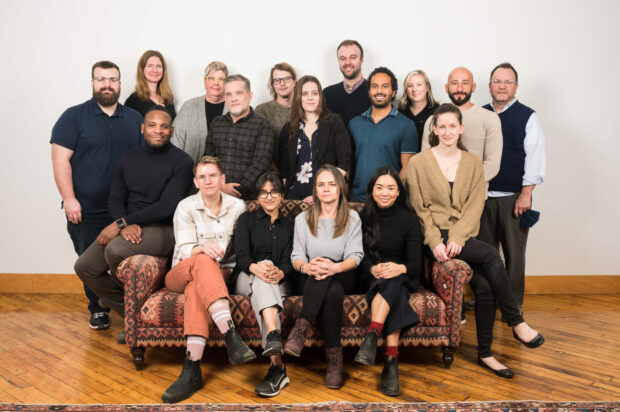
We are a dedicated team of human rights defenders and advocates on the frontlines of the fight for global LGBTQI+ rights. Hailing from diverse professional and personal backgrounds, we are united in one mission: to help LGBTQI+ people internationally attain safety.
General Inquiries
Media Inquiries
Donation Inquiries
Rainbow Railroad
401 Richmond Street West, Suite 360, Toronto, ON, M5V 3A8, Canada
Rainbow Railroad USA
575 5th Avenue, Unit 15-135, New York, NY, 10017, USA
